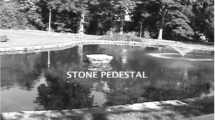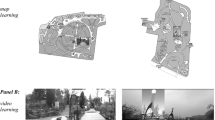Abstract
Navigated routes can be recalled by remembering a schematic layout or with additional sensory and perceptual details, engaging episodic memory processes. In this study, we contrasted the effects of these remembering approaches on retrieving real-world navigated routes, the impact on flexibly using familiar route information and on learning new spatial representations. In a within-subjects design, participants were oriented to recall familiar routes under two remembering conditions—a detail condition that promoted episodic memory processes and a gist condition in which routes were recalled via schematic processes. In each condition, participants performed two subsequent navigation tasks. They first described solutions to navigation problems that involved the recalled familiar route (e.g., navigating around a road block or to a new destination) and then learned and recalled a route within a novel spatial environment. All navigation descriptions were scored for the number of spatial references, entities, and sensory descriptions. We report the following findings. First, when describing the familiar routes, more details were generated in the detail condition, but a higher proportion of these details were spatial references in the gist condition. Route descriptions in the gist condition also relied more on egocentric spatial representations than in the detail condition. Next, when solving navigation problems in the familiar environment, solution routes were described with more details in the detail condition and deviated less from the familiar route than in the gist condition. Finally, the detail condition led to the preferential encoding of entity and sensory descriptive details of new spatial representations. These findings suggest that activating episodic processes at retrieval has distinct effects on how familiar information can be flexibly used and how new spatial representations are formed.





Similar content being viewed by others
References
Barsalou, L. W. (2008). Grounded cognition. Annual Review of Psychology, 59, 617–645.
Barsalou, L. W. (2010). Grounded cognition: Past, present, and future. Topics in Cognitive Science, 2, 716–724.
Brunye, T. T., Rapp, D. N., & Taylor, H. A. (2008). Representational flexibility and specificity following spatial descriptions of real-world environments. Cognition, 108, 418–443.
Burgess, N. (2008). Spatial cognition and the brain. Annals of the New York Academy of Sciences, 1124, 77–97.
Burgess, N., Becker, S., King, J. A., & O’Keefe, J. (2001). Memory for events and their spatial context: Models and experiments. Philosophical Transactions of the Royal Society of London. Series B, Biological Sciences, 356, 1493–1503.
Burgess, N., Maguire, E. A., & O’Keefe, J. (2002). The human hippocampus and spatial and episodic memory. Neuron, 35, 625–641.
Byrne, P., Becker, S., & Burgess, N. (2007). Remembering the past and imagining the future: A neural model of spatial memory and imagery. Psychological Review, 114, 340–375.
Cabeza, R. (2008). Role of parietal regions in episodic memory retrieval: The dual attentional processes hypothesis. Neuropsychologia, 46, 1813–1827.
Ciaramelli, E., Grady, C. L., & Moscovitch, M. (2008). Top-down and bottom-up attention to memory: A hypothesis (AtoM) on the role of the posterior parietal cortex in memory retrieval. Neuropsychologia, 46, 1828–1851.
Cohen, N. J. (2015). Navigating life. Hippocampus, 25, 704–708.
Conway, M. A., & Pleydell-Pearce, C. W. (2000). The construction of autobiographical memories in the self-memory system. Psychological Review, 107, 261–288.
Corbetta, M., & Shulman, G. L. (2002). Control of goal-directed and stimulus-driven attention in the brain. Nature Reviews Neuroscience, 3, 201–215.
Eichenbaum, H. (2004). Hippocampus: Cognitive processes and neural representations that underlie declarative memory. Neuron, 44, 109–120.
Hassabis, D., Kumaran, D., Vann, S. D., & Maguire, E. A. (2007). Patients with hippocampal amnesia cannot imagine new experiences. Proceedings of the National Academy of Sciences of United States of America, 104, 1726–1731.
Hassabis, D., & Maguire, E. A. (2009). The construction system of the brain. Philosophical Transactions of the Royal Society of London. Series B, Biological Sciences, 364, 1263–1271.
Henkel, L. A. (2014). The retrieval context of intervening tasks influences subsequent memory in younger and older adults. Experimental Aging Research, 40, 555–577.
Herdman, K. A., Calarco, N., Moscovitch, M., Hirshhorn, M., & Rosenbaum, R. S. (2015). Impoverished descriptions of familiar routes in three cases of hippocampal/medial temporal lobe amnesia. Cortex, 71, 248–263.
Hirsh, R. (1974). The hippocampus and contextual retrieval of information from memory: A theory. Behavioral Biology, 12, 421–444.
Hirshhorn, M., Newman, L., & Moscovitch, M. (2011). Detailed descriptions of routes traveled, but not map-like knowledge, correlates with tests of hippocampal function in older adults. Hippocampus, 21, 1147–1151.
Jacobs, L. F., & Schenk, F. (2003). Unpacking the cognitive map: The parallel map theory of hippocampal function. Psychological Review, 110, 285–315.
Jing, H. G., Madore, K. P., & Schacter, D. L. (2016). Worrying about the future: An episodic specificity induction impacts problem solving, reappraisal, and well-being. Journal of Experimental Psychology: General, 145, 402–418.
Konkel, A., & Cohen, N. J. (2009). Relational memory and the hippocampus: Representations and methods. Frontiers in Neuroscience, 3, 166–174.
Koutstaal, W., & Cavendish, M. (2006). Using what we know: Consequences of intentionally retrieving gist versus item-specific information. Journal of Experimental Psychology. Learning, Memory, and Cognition, 32, 778–791.
Koutstaal, W., Schacter, D. L., Galluccio, L., & Stofer, K. A. (1999). Reducing gist-based false recognition in older adults: Encoding and retrieval manipulations. Psychology and Aging, 14, 220–237.
Kurczek, J., Wechsler, E., Ahuja, S., Jensen, U., Cohen, N. J., Tranel, D., & Duff, M. (2015). Differential contributions of hippocampus and medial prefrontal cortex to self-projection and self-referential processing. Neuropsychologia, 73, 116–126.
Lux, S., Bindrich, V. N., Markowitsch, H. J., & Fink, G. R. (2015). Medial temporal lobe activation during autobiographical context memory retrieval of time and place and its dependency upon recency. Neurocase, 21, 23–32.
Madore, K. P., Addis, D. R., & Schacter, D. L. (2015). Creativity and memory: Effects of an episodic-specificity induction on divergent thinking. Psychological Science, 26, 1461–1468.
Madore, K. P., Gaesser, B., & Schacter, D. L. (2014). Constructive episodic simulation: Dissociable effects of a specificity induction on remembering, imagining, and describing in young and older adults. Journal of Experimental Psychology: Learning, Memory, and Cognition, 40, 609–622.
Madore, K. P., Jing, H. G., & Schacter, D. L. (2016a). Divergent creative thinking in young and older adults: Extending the effects of an episodic specificity induction. Memory and Cognition, 44, 974–988.
Madore, K. P., & Schacter, D. L. (2014). An episodic specificity induction enhances means-end problem solving in young and older adults. Psychology and Aging, 29, 913–924.
Madore, K. P., & Schacter, D. L. (2016). Remembering the past and imagining the future: Selective effects of an episodic specificity induction on detail generation. The Quarterly Journal of Experimental Psychology (Hove), 69, 285–298.
Madore, K. P., Szpunar, K. K., Addis, D. R., & Schacter, D. L. (2016b). Episodic specificity induction impacts activity in a core brain network during construction of imagined future experiences. Proceedings of the National Academy of Sciences of United States of America, 113, 10696–10701.
Maguire, E. A., & Hassabis, D. (2011). Role of the hippocampus in imagination and future thinking. Proceedings of the National Academy of Sciences of United States of America, 108, E39.
Maguire, E. A., Intraub, H., & Mullally, S. L. (2016). Scenes, spaces, and memory traces: What does the hippocampus do? Neuroscientist, 22, 432–439.
Maguire, E. A., & Mullally, S. L. (2013). The hippocampus: A manifesto for change. Journal of Experimental Psychology: General, 142, 1180–1189.
Maguire, E. A., Nannery, R., & Spiers, H. J. (2006). Navigation around London by a taxi driver with bilateral hippocampal lesions. Brain, 129, 2894–2907.
Moscovitch, M., Cabeza, R., Winocur, G., & Nadel, L. (2016). Episodic memory and beyond: The Hippocampus and neocortex in transformation. Annual Review of Psychology, 67, 105–134.
Moscovitch, M., Nadel, L., Winocur, G., Gilboa, A., & Rosenbaum, R. S. (2006). The cognitive neuroscience of remote episodic, semantic and spatial memory. Current Opinion in Neurobiology, 16, 179–190.
Moscovitch, M., Rosenbaum, R. S., Gilboa, A., Addis, D. R., Westmacott, R., Grady, C., … Nadel, L. (2005). Functional neuroanatomy of remote episodic, semantic and spatial memory: A unified account based on multiple trace theory. Journal of Anatomy, 207, 35–66.
Mullally, S. L., Vargha-Khadem, F., & Maguire, E. A. (2014). Scene construction in developmental amnesia: An fMRI study. Neuropsychologia, 52, 1–10.
Olsen, R. K., Moses, S. N., Riggs, L., & Ryan, J. D. (2012). The hippocampus supports multiple cognitive processes through relational binding and comparison. Frontiers in Human Neuroscience, 6, 146.
Poppenk, J., Evensmoen, H. R., Moscovitch, M., & Nadel, L. (2013). Long-axis specialization of the human hippocampus. Trends in Cognitive Sciences, 17, 230–240.
Rosenbaum, R. S., Cassidy, B. N., & Herdman, K. A. (2015). Patterns of preserved and impaired spatial memory in a case of developmental amnesia. Frontiers in Human Neuroscience, 9, 196.
Rosenbaum, R. S., Gao, F., Richards, B., Black, S. E., & Moscovitch, M. (2005). “Where to?” remote memory for spatial relations and landmark identity in former taxi drivers with Alzheimer’s disease and encephalitis. Journal of Cognitive Neuroscience, 17, 446–462.
Rubin, D. C. (2006). The basic-systems model of episodic memory. Perspectives on Psychological Science, 1, 277–311.
Rubin, R. D., Watson, P. D., Duff, M. C., & Cohen, N. J. (2014). The role of the hippocampus in flexible cognition and social behavior. Frontiers in Human Neuroscience, 8, 742.
Rudoy, J. D., Weintraub, S., & Paller, K. A. (2009). Recall of remote episodic memories can appear deficient because of a gist-based retrieval orientation. Neuropsychologia, 47, 938–941.
Schacter, D. L., & Addis, D. R. (2007). Constructive memory: The ghosts of past and future. Nature, 445, 27.
Schacter, D. L., Addis, D. R., Hassabis, D., Martin, V. C., Spreng, R. N., & Szpunar, K. K. (2012). The future of memory: Remembering, imagining, and the brain. Neuron, 76, 677–694.
Sheldon, S., & Levine, B. (2016). The role of the hippocampus in memory and mental construction. Annals of the New York Academy of Sciences, 1369, 76–92.
Spiers, H. J., & Maguire, E. A. (2007). The neuroscience of remote spatial memory: A tale of two cities. Neuroscience, 149, 7–27.
Strange, B. A., Witter, M. P., Lein, E. S., & Moser, E. I. (2014). Functional organization of the hippocampal longitudinal axis. Nature Reviews Neuroscience, 15, 655–669.
Teng, E., & Squire, L. R. (1999). Memory for places learned long ago is intact after hippocampal damage. Nature, 400, 675–677.
Williams, J. M., Ellis, N. C., Tyers, C., Healy, H., Rose, G., & MacLeod, A. K. (1996). The specificity of autobiographical memory and imageability of the future. Memory and Cognition, 24, 116–125.
Williams, J. M., & Scott, J. (1988). Autobiographical memory in depression. Psychological Medicine, 18, 689–695.
Zeidman, P., & Maguire, E. A. (2016). Anterior hippocampus: The anatomy of perception, imagination and episodic memory. Nature Reviews Neuroscience, 17, 173–182.
Acknowledgements
The authors would like to thank Judy Fung for contributing to scoring and Shayna Rosenbaum for helpful conversations about the experiment.
Author information
Authors and Affiliations
Corresponding author
Ethics declarations
Funding
This study was funded by an NSERC Discovery grant awarded to S. Sheldon (# RGPIN-04241).
Conflict of interest
Both authors (SS and AR) declare no conflict of interest.
Ethical approval
All procedures reported in this manuscript were in accordance with the ethical standards of McGill University.
Informed consent
All individual participants in these studies gave their written informed consent.
Rights and permissions
About this article
Cite this article
Sheldon, S., Ruel, A. The many routes of mental navigation: contrasting the effects of a detailed and gist retrieval approach on using and forming spatial representations. Psychological Research 82, 1130–1143 (2018). https://doi.org/10.1007/s00426-017-0882-6
Received:
Accepted:
Published:
Issue Date:
DOI: https://doi.org/10.1007/s00426-017-0882-6




